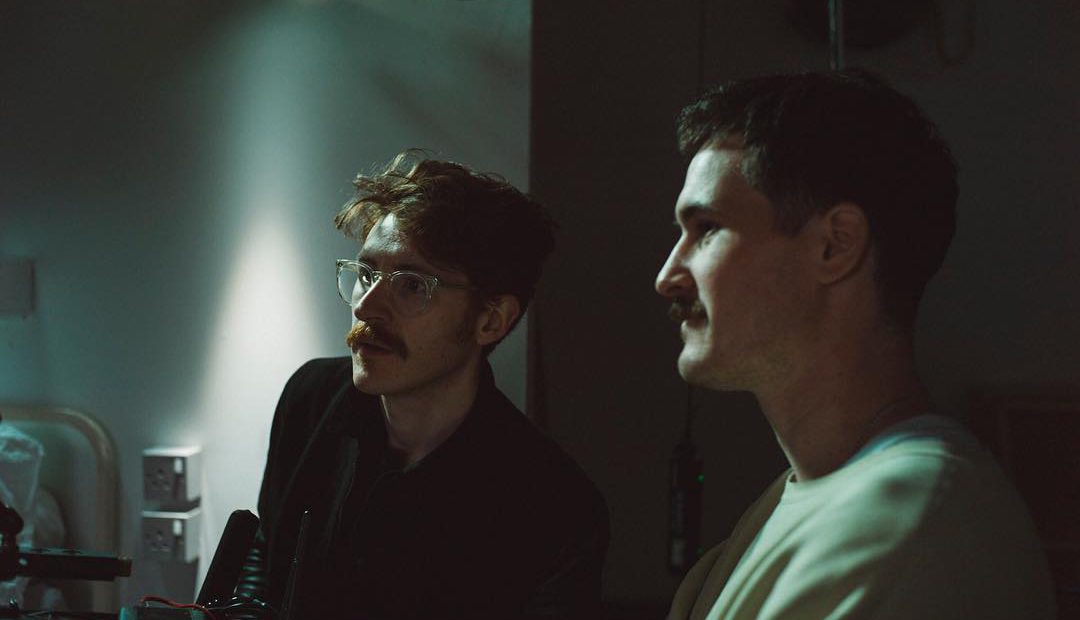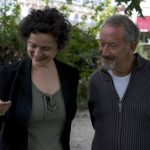In the darkly comic History of Nipples, Ron Burt (Joseph Macnab) falls down an existential rabbit hole pondering a question that all of us have asked at some point in our lives: What are men’s nipples for? Ron’s philosophical journey touches upon ancient superstitions and our modern obsession with utility on its way to a gruesome finale that justifies the film’s inclusion at this year’s FrightFest.
Speaking to FilmDoo, writer-director Bailey Tom Bailey reflects on his absurdity-tinged short and the surprisingly thoughtful themes it explores.
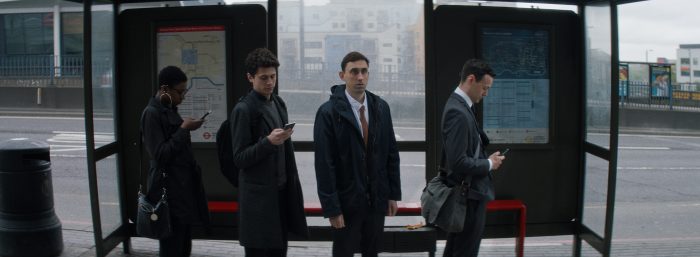
What was the inspiration for this film?
It initially came from a visit to the Natural History Museum of Dublin. There was one exhibition of these things that I call ‘bog bodies,’ which are essentially these bodies that have fallen to the bottom of bogs across most of Northern Europe and have become mummified. What they found with one body is that the person had been killed three times and their nipples had been cut off. They have this theory that the reason his nipples were cut off was because of this fertility ritual, which is in the film, where they would come to a king and they would kneel and suck on his nipple as a way to bring forth fertility to the land. But if it failed, then the king had his nipples removed and they killed him three times and threw him in a bog.
I walked from that and I was kind of like, “Huh, history of nipples,” because it’s such a tiny, funny little thing that you don’t think about having a great cultural importance. So I had that title and I thought that was kind of funny, and then I was like, oh, I can do a sort of sex education film, starting with that and then becoming this other thing. I’d never made that kind of medieval, Celtic film, and it felt too silly, but for years, I’d have a couple of beers and tell someone about it, and their reaction to the title alone and the rest would be so good that eventually I had to do it.
I think what was really interesting for me was my reaction and thoughts about this thing that I learned, because in western culture now, we’re increasingly a sort of post-faith society, and everything is essentially deemed meaningless. It’s fascinating that our body, which we now see as a machine, once had parts of it that were considered holy and had divine power. And it’s fascinating how things can change over time, so what we believe now is that it’s a completely useless organ left over from evolution. So he (Ron) worries that his body means nothing and that his life means nothing, and we have a crisis around that – a slightly ridiculous one, and his reaction to it is slightly ridiculous.
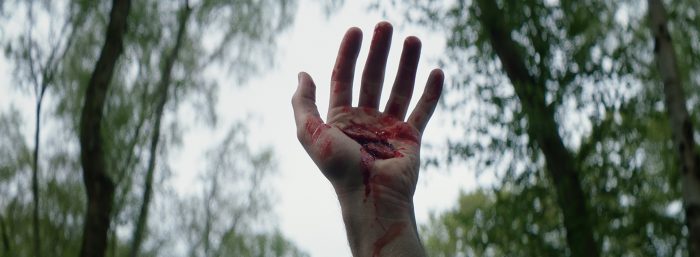
Did you do any further research into the history of nipples? Were there any other stories that almost made the film?
Yeah, I did look into it a little bit. I think initially it was everything that I associated with it. I think often, when I have an idea or I read about something, it will be my reaction to it that I tend to follow more. First thing I thought of, there’s the sexuality aspect, so a man and a woman, boyfriend and girlfriend became important to it. I did a bit of research into female reproductive organs. There was a part of the film I wrote in the script, and then I storyboarded. I had a bit of a detour and spent a little while trying to make these cross-sections of people, which is something I’ve always wanted to do.
A lot of my films have been about the insides of people, and how our bodies affect our everyday lives. So what’s difficult to do is to manifest that onscreen physically, and I quite like films that feel somehow diagrammatic anyway. It’s difficult to think of examples, but I always thought of Beckett plays as being diagrammatic. Sometimes Kubrick things are, Bresson films, maybe Roy Andersson, maybe Wes Anderson. So I’m always interested in doing that. So I nearly did a cross section of male and female reproductive organs, but it didn’t really fit in the film.
One thing that we did shoot, and it was an expensive thing to cut, but I remember, when I was in school, there was a time where I got called “mountain nips” a couple of times. I can’t remember if my nipples were particularly softer or redder, but I think that happens to teenage boys. The other rumour that I remember hearing is that if you empty a whole can of deodorant on someone’s nipple, then it would freeze. You could flick it off. And I remember hearing this when I was a teenager, so we kind of filmed that. That was supposed to be part of his reflection on what’s happening. But because he doesn’t freeze and flick them off, it seemed like too much of a detour in the end. It’s a fun thing that I think I might put online.
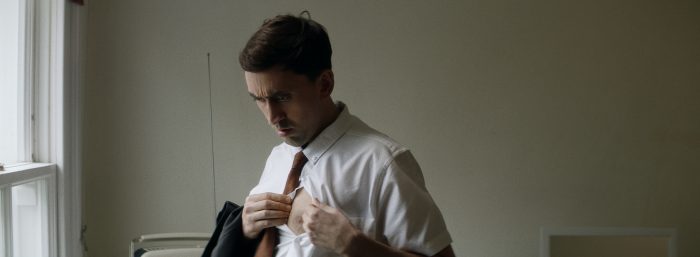
So there was that, and then I did read a bit more, tried to find out more about this fertility ritual. There were also accounts of shepherds, I think it was in Greece or Turkey that they would do this. They would go up with the young men, and they’d be shepherding together on mountains together for ages, and eventually they’d bond and suck each other’s nipples.
From here, the film delves into some surprisingly philosophical, existential territory. Is Ron’s conflict an extension of your own personality? Are you also looking for answers?
Yeah, I think I’m always in a state of existential crisis. I think anything to do with your body also encompasses that in a way, because it gives you life, it also will kill you, there are a million things that are going on inside of it that are mysteries to you. And then there are all these mysteries in the universe, and it’s kind of part of the universe, so in a way, your body is more primal than you are. It feels like it’s communicating with the universe.
I’m saying this as if everybody knows this. This is maybe a theory or notion of mine that parts of your body will be in conversation with the primal soup in a way that you’re not. Perhaps it’s trying to tell you things, but it’s a bad communicator. So it’s trying to send you signals that you don’t understand. Like often when you have pain, you don’t really know what’s actually wrong with you. I feel like our bodies could be communicating with us in that way. So yeah, I do have a tendency to look at most things that way, and then our body becomes the sort of arena that I do that through.
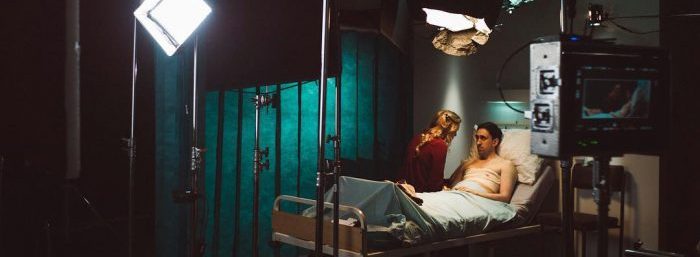
So have you found a use for nipples yet?
Well, I remember saying this to a couple of people who would then quickly rub my nipples, and be like, “Do you feel that?” I’m like, “Yeah,” and they’d be like, “Well, there you go.” So I guess some people use their nipples and find enjoyment that way.
Who were some of your creative influences for this film?
Because it was gestating for a long time, there’s a lot of different people. At a film festival a couple of years ago, I met a guy called Matt Kazman who made a film called Killer. It’s a brilliant film. It got into Sundance and all of that, but just before that happened, we met at Raindance, and we just got along, and eventually I saw his film. It was the first time it had been screened, and it’s really, really good. It’s a dark comedy.
His film became something I thought about a lot, but also, while we were talking, he told me that he was really into Todd Solondz. I’d seen Happiness and my memory of it was just that it seemed so cruel, but I went back, and I’ve seen most of his films now. I think he’s absolutely masterful in how he does stuff, this kind of absurdity, and every turn is like a wish fulfilment or seems implausible, but is so dramatically perfect that you go with it. So there’s quite a lot of that.
Regular people that I think about a lot would be Paul Thomas Anderson, David Lynch, Kubrick, I used to be quite into Bergman, but I’ve been looking at films for quite a long time. Originally, the last scene was supposed to be ripped off from Claire Denis’ Beau Travail. It went in a slightly different direction. I made it a bit more fun, and I think the actors got really into it being fun. I kept being like, “No, no, no, you’ve got to be more unsure about yourself when you’re doing this.” But I think it works pretty well on its own.
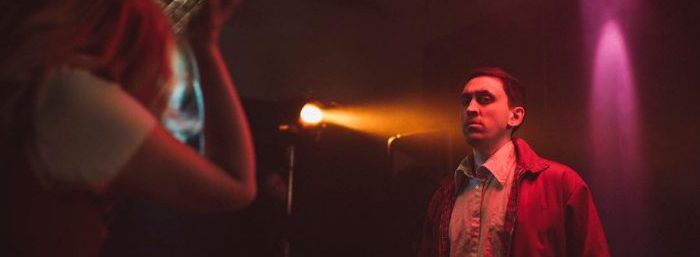
I guess I was also thinking of the end of Boogie Nights, when you finally see his penis. I wanted you to finally reveal his body after his violent solution, which I’m skirting around saying. There’s an irony there that he’s finally celebrating his body after he’s mutilated himself, which I hope won’t go unnoticed. But he is deluded. He makes the wrong choices all the way through. Even at the end, he’s not really learned his lesson.
You don’t share in his optimism, then?
No, I do share in his optimism. I guess I just mean that he wasn’t right to get that worried about it, his solution to deal with it was also not right, and then in the end… I don’t know, maybe you’re right. I think it was important for me that it was optimistic at the end. Actually, a lot of what he says in the hospital scene is something that I said after an intense personal experience when I was younger. This is it. This is all there is. And if this is all there is, I still want it. There was a time when I was younger that this existential stuff really, really did bother me, and I think at some point, you just accept that it’s not perfect. Maybe it means nothing, but it’s better than nothing. It’s pretty good. And you have to almost try and stay simple, and not get too caught up in those feelings.
What’s next for you after The History of Nipples?
There are lots of potential things that are largely dependent on me. I’m focusing on writing a feature called The Future Perfect. It’s about a young man who’s struggling with sleepwalking and these dark visions, and becomes torn between the influence of this criminal underbelly in his post-industrial home town and a spiritual movement who come to believe that he may be a visionary conduit. It’s more in the world of the other films I made. There’s humour, but it’s a lot darker. I’m calling it a metaphysical neo-noir, but it’s also kind of a coming-of-age story.
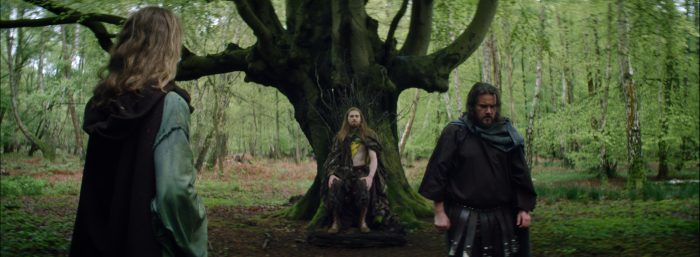
The other thing that I may make a short of and may eventually want to expand into a feature is about a man who has this sexually euphoric fixation on safety pins, and how that’s tearing his relationship apart, and why he has this fixation.
So there’s that, and also, my sister’s pregnant, and I wanted to make a film about birth. It’s this abstract, experimental film. It’s somewhere between a Chris Cunningham film and classic religious painting. It’s about sexuality and birth and bodies melding into each other. I’ve pitched versions of this for different things at different times, and this seems like a project I could do. Obviously, there’s a ticking clock, so it may not be made with my sister in the end.
Across your work, would you say that there are any particular themes that you keep coming back to?
The regular things are, first of all, a fascination with the human body and everything that means to me, which is threats of disease and mental health, things like that. There’s also the fact that we live with these mysteries that affect everything that we do, but we’re unable to control them. We don’t understand, but it’s constantly sending us bad messages or garbled messages. And then spirituality is something that comes up a lot. There’s a couple of times where I suppose I have dealt with it a bit more head-on, but I think it tends more to be a primal spirituality, as opposed to something from an organised religion. I suppose those are the two main things: bodies linked to the cosmos, and spirituality.
We’re almost done here, but is there anything else you’d like to add?
The other thing would be just to say that I think whatever I make in the future will be a fusion of genre, and I suppose some of these interests of mine are a bit more from an arthouse world. I really love Ari Aster at the moment, and what he’s doing, that kind of elevated horror stuff is quite in my lane.

